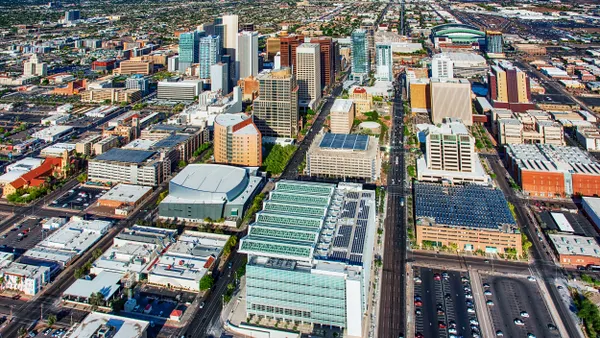UPDATE, Oct. 25, 2018: In an emailed statement to Smart Cities Dive, Transdev said it voluntarily elected to stop its autonomous school shuttle pilot a week early, before NHTSA issued a statement. Transdev assured it operated the pilot with the "highest standard of safety" for five weeks.
"This small pilot was operating safely, without any issues, in a highly-controlled environment," the statement reads. "Transdev believed it was within the requirements of the testing and demonstration project previously approved by NHTSA for ridership by adults and children using the same route ... Transdev does not – nor would ever - sacrifice safety for progress and is fully committed to compliance with all relevant regulations."
Dive Brief:
- The National Highway Traffic Safety Administration (NHTSA) is putting a halt to a Florida pilot transporting children to school in an autonomous school bus. In a letter to Transdev North America, the federal agency says the use is in violation of the company’s temporary importation authorization and orders the company to stop, or face possible civil penalties or a loss of its importation authorization.
- According to NHTSA, Transdev in March was granted permission to use its EZ10 Generation II driverless shuttle for a specific demonstration project, but not as a school bus. Buses, the agency notes, are subject to strict federal safety standards.
- "Innovation must not come at the risk of public safety," NHTSA Deputy Administrator Heidi King said in a statement. "Using a non-compliant test vehicle to transport children is irresponsible, inappropriate, and in direct violation of the terms of Transdev’s approved test project.”
Dive Insight:
Transdev announced in September that it planned run on-road tests of its shuttle service with children, with the goal of eventually building a door-to-door, on-demand service operated through a smartphone app that could take any student within Florida’s Babcock Ranch community to its school. The initial pilot restricted itself to a pre-determined route, had a top speed of just 8 miles per hour and promised a safety attendant on board at all times (according to the company, the shuttle’s automatic braking system could react 30 times faster than a human driver).
Although companies are running autonomous shuttle demonstrations in cities across the country, the higher safety standards for school children puts Transdev on the outside, at least for now.
The early rollout of autonomous vehicles (AVs) is being closely monitored by federal, state and local governments with limited uses, in order to avoid another incident like the fatal crash with an Uber self-driving car in Arizona this spring. Even as the US Department of Transportation eases some restrictions to allow for more pilots and applications of autonomous technology, there are still clear limits on how far it will allow some companies to go.









